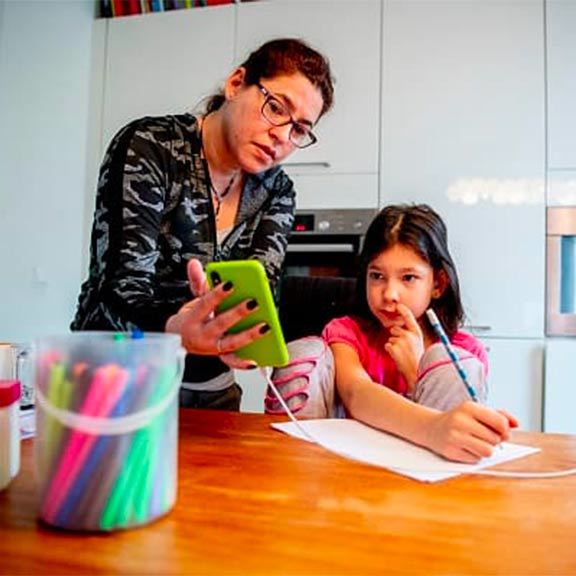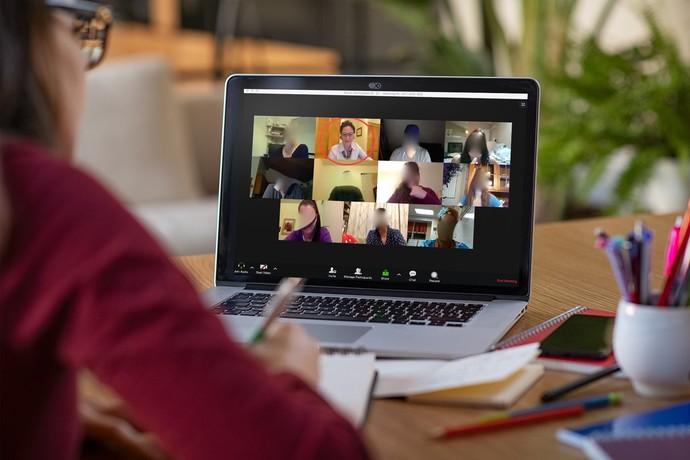Digital Learning During Covid – 19 Pandemic
- The house turns into a classroom, and parents take the role of teaching assistant or learning partner, whether they are prepared or not, said a Turkish social media expert.
- “The new type of coronavirus (Covid - 19) epidemic, which became a pandemic in a short time after its emergence in Wuhan, China, affected our lives in many ways. School and face-to-face education has also been seriously affected by the coronavirus epidemic, which has killed hundreds of thousands of people and affected millions of people worldwide,” Deniz Unay, a social media expert, told Anadolu Agency.

- “Even though distance education models had to be implemented by many public and private institutions in this period, the difficulties of home education started to worry families and educators. Governments, trying to implement distance education models with the right strategies and practices, are trying to increase the communication between educators and children and make them more efficient,” he continued.

Increasing technology addiction
- Unay pointed out that the fact that children and parents spend more time at home during long quarantine periods has increased their dependence on technology. Considering the usage statistics before and after the pandemic around the world, it is seen that the usage has doubled, and the technology addiction has become increasingly apparent. Increasing physical and psychological problems with increasing technology addiction cause families and educators to worry about what to do.

Distance education and inequality around the world
- Between April and August 2020, Human Rights Watch held 57 remote interviews with students, parents, teachers and education officials in Burkina Faso, Cameroon, Democratic Republic of Congo, Kenya, Madagascar, Morocco, Nigeria, South Africa and Zambia to find out about the effects of the pandemic on children's education. In this research, it is shown that school closures caused by the pandemic worsen pre-existing inequalities and that children most at risk of exclusion from quality education are the most affected. Some striking answers from these interviews are as follows:
- "I don't think I have the discipline to sit down and nobody taught me."
- "Most subjects are difficult to understand without the help of a teacher."
- “It was a little annoying. I have the [graduation] exam next year and I think I need to work harder for this. "

Digital literacy differences
- Unay stated that many parents find it difficult to fulfil this task of being a teaching assistant, especially those with limited education and resources. On the other hand, working parents tend to leave children unattended, which can lead to varying quality of learning and even risky behavior. This ensures a close parent-school partnership as well as strong and supportive parenting education, which has never been more important to the education system.

- Additionally, mental health is important. An epidemic is a traumatic experience for children and adolescents, especially for those who have had close contact with confirmed cases or have experienced the death of a family member or friend. Stress and depression can increase as a result of the lack of social contact that occurs through social activity and human interaction in schools. Social isolation in case of social distancing and school closure can be further exacerbated by anxiety from difficulties in the new online learning mode. Overall, the fight against coronavirus is a test of courage and perseverance for both individuals and nations. This has made mental health and mental counseling one of the basic educational elements in schools.
- “Children's social lives and learning abilities were negatively affected during this pandemic,” he continued.
- “This will also result in large numbers of school dropouts. Teaching moves online on an untested and unparalleled scale. It is now clear that there is an enormous lack of digital skills in the current education system and that these digital competencies are equally needed in different professions. Ultimately, as a result of these digital skills shortages, there is a need, among other things, to reverse existing digital skills training policies, to retrain teachers about various aspects of digital education by teaching subjects.”
- “This process will result not only in the drop-out rate, but also in a decrease in the quality of education. Internet access is limited in developing countries, and very few teachers have knowledge and experience of this new method.”
- According to Unay, open and non-formal education programs will be required to gain skills for those leaving the formal education system. Similar programs for parents and caregivers should be provided through the media. Especially local radio and television stations should provide counseling and advise people on the challenges of school closures related to education, and give them tips on how to deal with them.

Problems with Distance Education
- “With the distance education, the increase in the cost of accessing education has become a serious problem for families who have low income and cannot access computers and internet. In addition, digital illiterate parents cannot not manage the process effectively and that causes problems within the family.”
- “Education and training institutions are environments where people learn, teach, and feel safe, and they provide a sense of structure, community and socializing opportunities. The anxiety, stress and social isolation caused by the fear of pandemics pose a difficult situation, especially for those at risk within the family.”
- “Students, especially those with low skills, sometimes lack the digital skills required to participate. In digital learning, this can affect their skills development and re-skilling opportunities. On the other hand, education was planned to involve students within the school boundaries, and what happened shows that there is no plan for what education will look like when the school door is closed,” he continued.
So what to do?
Unay put forward some ideas for the solution to this situation.
- In this process, equality of opportunity in education should be ensured by taking faster actions for material access and internet access.
- Distant counseling and guidance services should be provided by providing psychological support, especially to families staying in long quarantine periods.
Targeted support should be provided for students with special education needs, and plans should be made especially for the education of disabled students. - Necessary conditions should be prepared for students who need to study in workshop areas that require practice in vocational education.
- Access to digital content in libraries should be facilitated, while audiobooks should be more accessible. Governments can support open educational resources and open digital access.
- Meals should be provided for students from socio-economically disadvantaged backgrounds.
- Various psychological support teams should be created for students, families, and teachers.
- Quality education cannot be provided by content built outside the pedagogical field and out of human relations between teachers and students.
- Education cannot be dependent on digital platforms controlled by private companies either.
- Unay emphasized that we can gather the opinions of experts on the situation caused by the epidemic under two headings as school climate and education process. Students have been deprived of many opportunities such as security, nutrition, social relations, psychological support and similar opportunities that they benefit from the school climate. Students who learn by modeling from their peers and need the support provided by the teacher's spiritual presence are at a disadvantage in terms of meeting their educational needs even if they have access to digital. On the other hand, the pre-existing inequality for those in risky family environments has increased even more.
- Psychologists points out that in the execution of the educational process, some students cannot work towards a target, need external motivation, lack digital skills, and have no parents to assume the role of learning assistants, and they are emotionally disconnected and excluded from the education process to a level that can be expressed as dropout. The absence of a positive climate in terms of education at home, differences in digital skill levels of both parents and students may result in inequality of opportunity in education at a level that can be expressed with the concept of "gap" between students.
- “For this reason, states need to develop policies for access to education, educational climate, social and emotional support, reducing the risks arising from lack of supervision, acquiring digital skills, conducting measurement and evaluation properly, and enabling trainers to acquire new skills according to the new situation. Digital skills can have the potential to be decisive in all business areas. Therefore, states that support access to digital and the beneficial use of digital foresee that they will be advantageous in terms of development,” he concluded his remarks.
- Who is Deniz UNAY https://wikitia.com/wiki/Deniz_Unay
- Deniz UNAY "Author & Expert"
- Links to my interview this :
- https://www.aa.com.tr/en/education/-digital-learning-faces-hurdles-amid-pandemic-/1980180
- http://www.turkiyenewspaper.com/technology/12801.aspx
- https://www.yenisafak.com/en/news/digital-learning-faces-hurdles-amid-pandemic-3549786
- https://www.alaturkaonline.com/digital-learning-faces-hurdles-amid-pandemic/
 Girl's Behavior
Girl's Behavior  Guy's Behavior
Guy's Behavior  Flirting
Flirting  Dating
Dating  Relationships
Relationships  Fashion & Beauty
Fashion & Beauty  Health & Fitness
Health & Fitness  Marriage & Weddings
Marriage & Weddings  Shopping & Gifts
Shopping & Gifts  Technology & Internet
Technology & Internet  Break Up & Divorce
Break Up & Divorce  Education & Career
Education & Career  Entertainment & Arts
Entertainment & Arts  Family & Friends
Family & Friends  Food & Beverage
Food & Beverage  Hobbies & Leisure
Hobbies & Leisure  Other
Other  Religion & Spirituality
Religion & Spirituality  Society & Politics
Society & Politics  Sports
Sports  Travel
Travel  Trending & News
Trending & News
What Girls & Guys Said
Opinion
1Opinion
very difficult and quite challenging, yes... which is why I am doing my part to help, when/with what I can...
Share the first opinion in your gender
and earn 1 more Xper point!